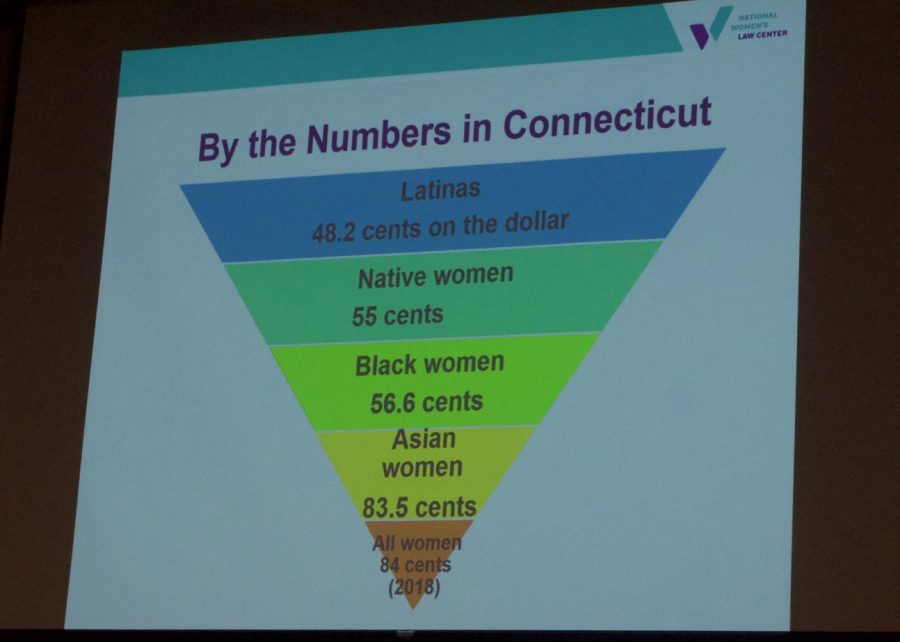Connecticut Women Discuss Gender Pay Inequality
Latina and Hispanic women are make the least amount of money per dollar in Connecticut.
November 20, 2019
As the U.S. Women’s National Soccer Team managed to secure their title as champions of the 2019 FIFA Women’s World Cup, they faced an even bigger battle back home in their own playing field — one that 82 percent of women in the workplace take on everyday.
While meeting with Alyssa Naeher, Trumbull native and starting goalkeeper for the U.S. Women’s National Soccer Team, Lieutenant Governor Susan Bysiewicz discussed the gender discrimination lawsuit the team has made against the U.S. Soccer Federation. The lawsuit highlighted the vast differences in pay amongst the gender-segregated teams, along with their unequal working conditions.
“[Naeher] pointed out if both the men’s and women’s national teams won all of their 20 friendly matches over the course of the calendar year, the average U.S. Men’s National Team player would earn $263,000 compared to the $99,000 the women’s soccer player would make,” Bysiewicz said. “And imagine that when the women were exponentially better than the men.”
Bysiewicz noted that the pay inequality between genders has been a concern across various workplaces in the country, including in Connecticut. This became a major point of discussion at the Gender Pay Equity Conference at Central Connecticut. Throughout the forum, attendants discussed the current status of gender pay equity within the state, how communities are racially disproportionately impacted by such wages and ways to close the gap between men’s and women’s pay.
The event was hosted by the CCSU Ruthe Boyea Women’s Center, Student Government Association and the Center for Public Policy and Social Research O’Neill Endowed Chair, along with several sponsors.
Keynote speaker Maya Raghu of the National Women’s Law Center went in depth on Bysiewicz’s points for the need for change within the workplace. Raghu emphasized the main drivers of the gender wage gap were occupational segregation, lack of support from the workplace and discrimination/stereotypes against women.
“A recent study found that if women were paid received equal pay compared to their male counterparts we can poverty rate for women in half, and I think that’s a goal we should all be working towards” Raghu stated.
“No matter where [women] work, there is a wage gap across virtually every occupation. Whether women are working in low-wage jobs, like cashiers, middle-level jobs, like travel agents, or high wage jobs, like physicians or lawyers. Part of that is because, as Lieutenant Governor mentioned, women — in particularly women of color — are overrepresented in low-wage jobs,” Raghu continued.
Part of the solution, Raghu stated, is to begin to make the conversation wage inequality acceptable in the workplace, shifting the responsibilities to employers rather than men versus women.
Nancy “Rusty” Barcelo, interim vice president of the Office of Diversity and Inclusion, also partook in the forum, in which she pushed for young adults’ involvement to make the dialogue on change “invigorating,” and “honest.”
Barcelo recalled participating in the 1970s Equal Rights Amendment Rally in Chicago. During that particular point in time, women were being paid “59 cents for every dollar that a man made,” she stated. Nearly 50 years later, she cited a recent state report proclaiming Connecticut women still receive less than the average male residents’ dollar.
According to a study by the National Women’s Law Center, it is found women in Connecticut receive 83.6 cents compared to their white, non-Hispanic male counterpart’s dollar. In which, Asian women make 83.5 cents, white, non-Hispanic women earn 77.5 cents, Black women make 56.6 cents, Native women earn 55 cents and Latinas make 48.2 cents.
Despite these statistics, Bysiewicz believes Connecticut will become a leading state in the movement for gender pay equity, calling on the belief that “women’s issues are economic issues.”
She admits that the state does have a lot of work to do, but believes with their “progressive acts,” they will be able to move such initiatives forward. Some of which that Bysiewicz mentioned included the state’s implementation of increasing the minimum wage to $15 by 2023, providing better healthcare and economic opportunities to low-income families, as well as the bill passed two years ago prohibiting employers from asking applicant’s of their previous salaries.
Raghu noted that the practice of salary negation is one of many practices that continues to perpetuate the wage gap. In order to minimize the gap within genders and resolve other related matters, Governor Ned Lamont created a counsel — consisted of mostly females — committed to improving education, economic opportunities and workforce development, leadership and health and safety for women and girls in the state.
“Since taking office, we have been focused on advancing priorities for women and girls,” Bysiewicz stated. “Our mission is to ensure that the priorities of women and girls are considered at every cabinet level, agency and every decision that our commissioner’s make.”
“We are now in the phase of working with the public to advance these themes in a statewide basis,” Bysiewicz continued.
She further explained how the counsel has been actively working with the Paradigm for Parity movement, a coalition of leaders who look to address the large gender gap in corporate America, to increase the number of females on board of directors/leadership teams in Fortune 500 companies in the state to 50 percent by 2030.
As more of the conversation for gender pay equity continues, several of the speakers at the forum reiterated for the generation of women and future ones to demand for an open dialogue on the wage gap. Despite President Dr. Zulma Toro’s absence, Barcelo spoke on her behalf, stating Toro encourages others to create the dialogue of gender pay inequity so that they and others can move forward.
“Although Connecticut has made some really important strides and passed significant legislation in the past few years, there’s still more work to be done. Luckily, you have fantastic leadership and a government who wants to lead on these issues,” Raghu stated in her final notes.




